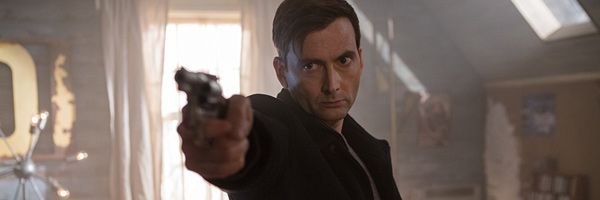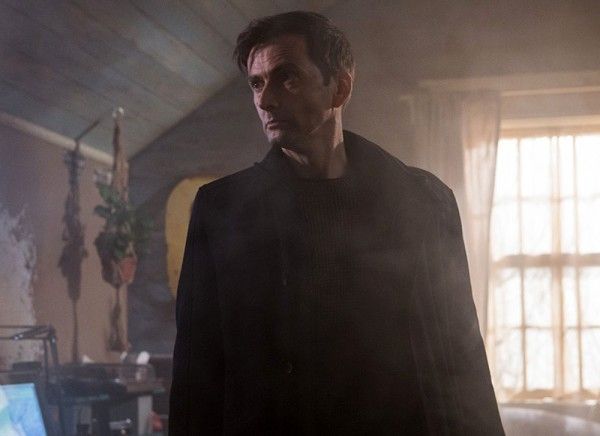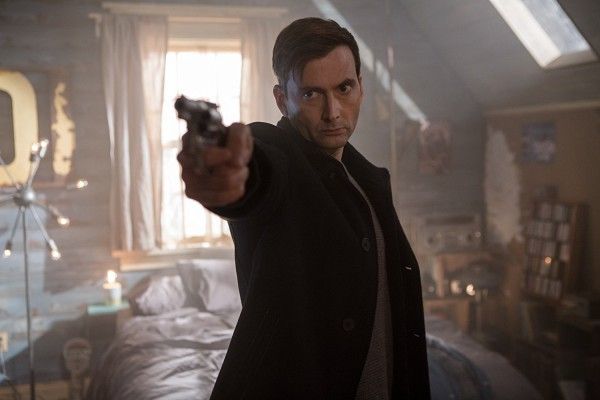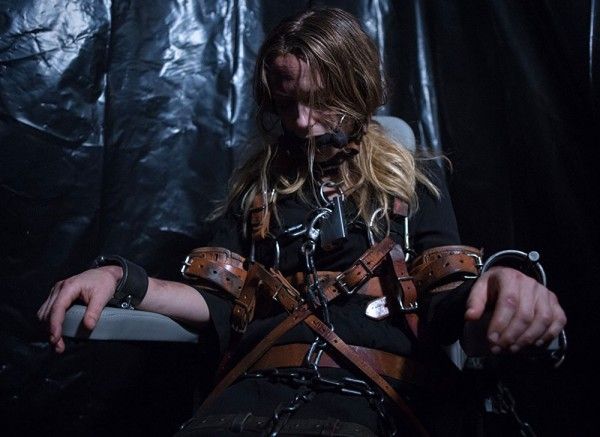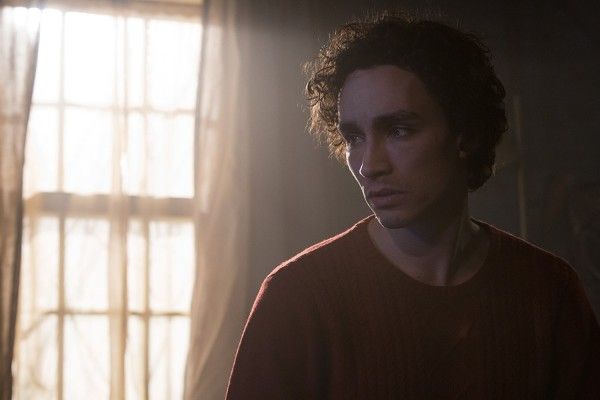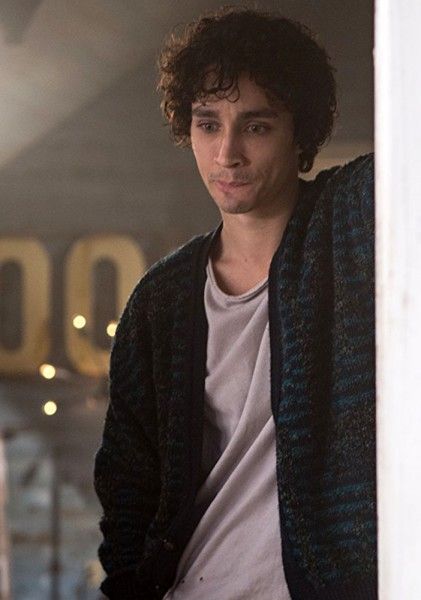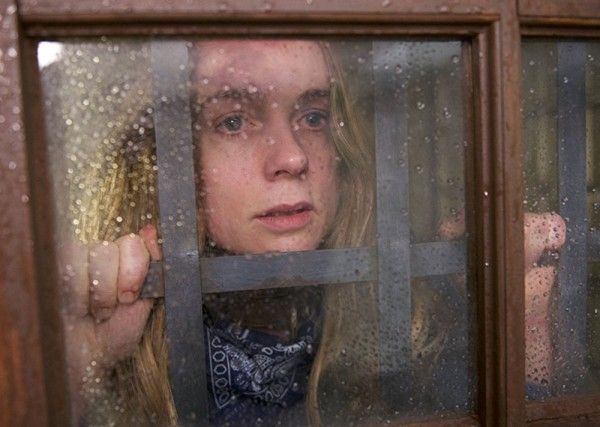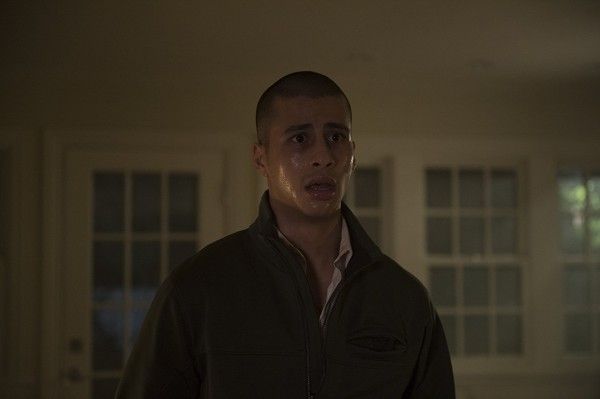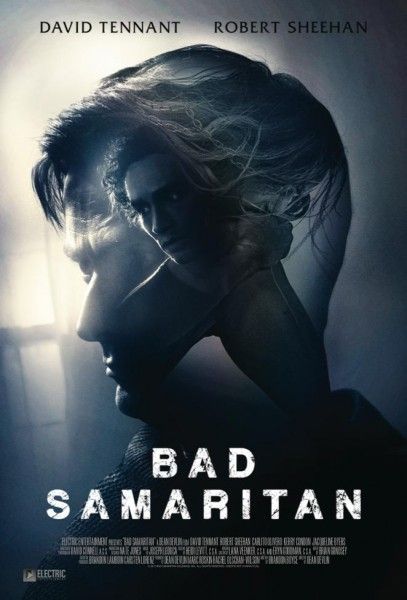From writer Brandon Boyce (Apt Pupil) and director Dean Devlin (Geostorm), the thriller Bad Samaritan follows Sean (Robert Sheehan) who, along with his best friend (Carlito Olivero), is a valet at a local restaurant in Portland, Oregon, where the two men burglarize the houses of customers while they eat. It’s a situation that works for them, until Sean robs the wrong customer – a wealthy man named Cale Erendreich (David Tennant) – and discovers that he’s holding a woman (Kerry Condon) captive and, in order to save her, he must endure the wrath of the kidnapper, who now seeks revenge on him.
At the film’s Los Angeles press day, Collider got the opportunity to sit down with actor David Tennant and chat 1-on-1 about playing the villain, understanding your character’s decisions, the most difficult scenes to shoot, and what it was like to work with Dean Devlin, as a director. He also talked about the experience of working with Neil Gaiman on the Amazon TV series Good Omens and the fun of a character like Crowley, playing an ordinary guy on HBO’s Camping, what he looks for in a project, how lovely his fans are, and being a big fan of The West Wing.
Collider: I can only imagine that talking about this guy all day must be interesting!
DAVID TENNANT: It is, yeah! People seem very concerned. I had to visit some very dark places, but there is something quite liberating about indulging in that behavior, guilt free.
And being able to say that it’s not you and that you’re just acting.
TENNANT: Exactly! It’s not me. It’s an entirely safe environment. Nobody is getting hurt, psychologically, mentally or physically, and you get to see what it might feel like to be that devoid of any moral compass. It’s quite interesting.
Do you feel like, between this guy and Kilgrave, you’ve balanced out the heroes that you’ve played?
TENNANT: I don’t know. Maybe there is a cosmic balance to try to achieve. It’s not conscious. It’s just the way things have presented themselves, but I like being able to swing between different types of characters and different types of moral standpoints. It’s very reason why I went into acting, I suppose You get to pretend to be all these different people.
Could you ever see yourself playing somebody totally ordinary, who’s not a hero or villain?
TENNANT: I ’m doing that right now, actually. I’m doing this thing, called Camping, for HBO right now, and I’m playing very much an everyday guy, as vanilla as you could wish for. In a sense, that’s fascinating, as well. He has a story, which comes out, but when we first meet this character, he’s a bloke and an everyman. That presents interesting challenges, in itself. You have to try not to be too interesting.
Did you know how normal he’d be, when you signed on to play him, or did he just turn out that way?
TENNANT: Yeah, it was very evident in the script. He’s a dad who works in insurance. I love that. That’s the pleasure of the job, for me. I’ve been very lucky that different things have kept presenting themselves, and that there’s a variety of things that have kept presenting themselves. That’s what’s kept me very much loving my job.
When you play a guy like this, who clearly is not a good guy and even has a murder room, do you try to find ways to understand that or sympathize with him, or do you just have fun being bad?
TENNANT: Yeah. You’ve got to find why that person feels like these are legitimate decisions to make. Obviously, they are very far from the decisions that you, as a human being, hopefully would make yourself, but you’re trying to key into that mind-set. I’m not suggesting you get to a stage where you find all his actions forgivable, but you just try to find what the psychology of that is and try to key into it. Maybe that’s better than saying you understand or empathize with it, and that’s partly to do with trying to understand what psychopathy is, for me. What is that, when you don’t feel any empathy or guilt? Where does that leave you? If you can find a position where other people’s pain means nothing to you, then what are you looking for in life, what satisfies you and what are you chasing? You start to begin to construct an understanding of what takes someone to that place because otherwise you’re just a pantomime villain. That’s the danger, isn’t it? Cale, within this story, has a very specific role to play, in terms of the narrative. He’s a monster, and that’s what makes the story a thriller. That’s what get people jumping out of their seats and spilling popcorn down each other’s backs. My job is to try and ground that in something that feels like a plausibility.
He’s an interesting character because he seems to clearly know that he doesn’t really have any feelings.
TENNANT: A lot of psychopaths understand that they have a condition. They are not like other people, and it’s seeing that as an advantage to life, rather than a disadvantage, which is the 99% of society. Statistically, 1 in 100 people is a psychopath, which is quite a lot. That means we all know some people that are psychopaths, who are presumably dealing with life in a perfectly acceptable way and are going about their business and are not unsettling us. That’s interesting, in itself. Cale can exist in society, in many ways more comfortably than Sean does. Sean is on the fringes of society, whereas Cale is absolutely establishment and he knows how to work that. As long as people don’t look too hard, they would never question that he’s a successful, wealthy, accomplished man.
There are some pretty dark, intense and violent scenes, throughout this film. Was there anything that you found particularly challenging to shoot?
TENNANT: The scenes where I’m making Kerry [Condon] particularly uncomfortable, there’s an element of that where, just as a polite human, you feel slightly uncomfortable with. Of course, she’s such an accomplished actress and so easy to work with, so once you get beyond that, you can inhabit those extremes of human behavior.
It seems like a situation where you might find yourself apologizing a lot to your scene partner.
TENNANT: Yeah, potentially. Most of my stuff was with Kerry and Robert, and we were all very keen to make the characters part of a credible world, so they were perfectly willing to let me indulge Cale’s more unpleasant corners.
How did you find the experience of working with Dean Devlin, as a director?
TENNANT: Dean brings a great many years of experience and expertise. It was made in Portland, Oregon, at this studio where Dean has been working for years, on a couple of TV shows and various other projects. Therefore, it felt like you were coming into the bosom of a family. The crew all knew each other because they’d worked together before. There was a real .love for the city, for the studio, and for Dean. Everyone wanted to please Dean. He’s a real captain of the ship that engenders loyalty in the people that work for him, and that’s just because he’s a genuine bloke. He’s genuinely enthused and excited by what he’s trying to do, and that’s contagious, so it was a real pleasure to work for him.
You’re also a part of the Amazon TV series Good Omens, which I’m very excited about!
TENNANT: Good, I’m glad!
What was the attraction to that? Was it Neil Gaiman, specifically, or was it the story and character?
TENNANT: Obviously, a Neil Gaiman story, in itself, is appealing. The fact that Neil was so involved, as the showrunner and he’s written all the scripts, and I knew that Michael Sheen was involved, and Douglas Mackinnon, a director I knew of old, was directing, and just the sweep and scope of the story and the resources that we had to make the story with, just felt like this was a project that was going to be very exciting, and I wanted to be a part of it.
What did you enjoy about playing Crowley, and the relationship between your character and Michael Sheen’s character, Aziraphale?
TENNANT: Well, it’s a bit of a double act. They are yin and yang, really. I enjoyed playing almost every scene with Michael Sheen. He’s someone I’ve known for years. We never really acted together, but I knew him and I knew his work, and I knew that it was gonna be fun, and indeed it was. He’s great to bounce off. He’s never not engaged, in any moment of a scene, and it makes you better to have someone to play with who’s that present and skillful. Crowley is a great character. He’s a demon, and they’re averting the apocalypse. We get to see them throughout all of human history. There were so many things that were just gonna be fun to get involved with. Just to be a part of this story that people love so much and that means so much to people – this novel has such a following – it can be intimidating because you don’t want to break it, disappoint people, or let people down, but it felt like the team was robust enough to make it something worth doing.
How did you find Neil Gaiman, as a showrunner?
TENNANT: Oh, fantastic! He was very present and very involved, but also hugely creative. He’s lived with this novel for so many years. It was such a formative experience for him, as a writer, writing with Terry Pratchett. And with Terry Pratchett no longer being with us, Neil has become the caretaker for the memory of Terry. I think he would acknowledge that, himself. So, he’d be entirely forgiven for being rather proprietorial about the whole thing and about wanting things done in a very prescriptive way. And whilst he had a very clear, very strong, and very persuasive view of the material, which was fantastic to have access to, he was also interested in what people brought to it. He was genuinely interested in the collaborative art of making it from a novel into something else. He actually couldn’t have been better, from that point of view, just having his skills available to us, all the time, and to have a conversation about these characters and about the show, as it developed. The whole thing was a wonderful experience.
At this point in your career, what is it that you look for in a project? Does it always start with the script, or is who you’ll be working with important to you?
TENNANT: I always say that you can ruin a good script, but you can’t make a bad script good, so a good script is a pretty fundamental starting point. It’s a lesson to remember, that you can get on board with a project and think, “Well, the script is nearly there, so I’m sure we’ll sort it out.” And then, three weeks in, you go, “The script wasn’t there and I knew that, and I’m still here trying to fudge it. Hopefully, that’s a lesson that I continue to get better at learning. The script has got to be the starting point, but then, it’s the collaborators and the situation. Sometimes where something films is relevant, and things like family come into play there, as well. There’s a number of reasons why things work out when they do, and why other things don’t. I never go looking for a specific type of project because you’ll only just end up disappointed. If you have the luxury of being able to choose jobs, you just to have to react to what’s there and see what comes next. It’s not that I’ve been particularly tactical or particularly good at crafting a career path. I stumble from one thing that feels like fun to the next thing that feels like fun. It’s so much better to just go, “Okay, what’s next?” And then, suddenly, you find yourself playing Walt, who works insurance and who’s got kids, and before that, I was averting the apocalypse with Michael Sheen. When I look at that objectively, I couldn’t plan that and make that happen any more perfectly.
You have some very loyal and devoted fans. What’s it like for you to have fan encounters, with the wide range of characters you’re known for?
TENNANT: It’s lovely. To meet people who get excited about things that you’ve done is rather humbling and slightly bawdy. People can be so engaged by a piece of work that you’ve done, which is hugely flattering, but it’s also hard to connect yourself to that sometimes because the stories take on lives of their own and my contribution to it is just one of many people who’ve collectively made a story come to life. Because you’re the face of it, they’ll put it onto you, which is lovely, but I often feel like I’m not extraordinary enough or exciting enough to really be bearing witness to this person’s enthusiasm. I understand that, as someone who’s been a fan of things. If I meet someone from The West Wing, there’s so much that I’m imbuing their presence with and so many things that they can’t, as a human beings, necessarily live up to. One time, that happened, and they were terribly gracious about it, so I know what it’s like to be excited about a piece of work, or a piece of art. You just have to try to be as gracious and humble about that as you can. It’s lovely to have been a part of things that have meant so much to people. You want to tell stories because you want to have a connection with people, so it’s wonderful when you get glimpses of that having happened.
So, you’re basically saying that if Aaron Sorkin ever gets his The West Wing revival going, that you’d be lining up to be a part of that?
TENNANT: I would crawl over broken glass, yes!
Bad Samaritan opens in theaters on May 4th.

